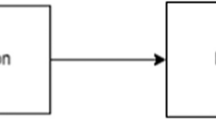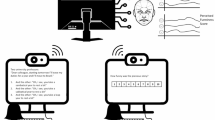Abstract
Facial expression trackers output measures for facial action units (AUs), and are increasingly being used in learning technologies. In this paper, we compile patterns of AUs seen in related work as well as use factor analysis to search for categories implicit in our corpus. Although there was some overlap between the factors in our data and previous work, we also identified factors seen in the broader literature but not previously reported in the context of learning environments. In a correlational analysis, we found evidence for relationships between factors and self-reported traits such as academic effort, study habits, and interest in the subject. In addition, we saw differences in average levels of factors between a video watching activity, and a decision making activity. However, in this analysis, we were not able to isolate any facial expressions having a significant positive or negative relationship with either learning gain, or performance once question difficulty and related factors were also considered. Given the overall low levels of facial affect in the corpus, further research will explore different populations and learning tasks to test the possible hypothesis that learners may have been in a pattern of “Over-Flow” in which they were engaged with the system, but not deeply thinking about the content or their errors.
Access this chapter
Tax calculation will be finalised at checkout
Purchases are for personal use only
Similar content being viewed by others
References
Ahmed, A.A., Goodwin, M.S.: Automated detection of facial expressions during computer-assisted instruction in individuals on the autism spectrum. In: CHI Conference on Human Factors in Computing Systems (2017)
Baker, R.S., D’Mello, S.K., Rodrigo, M.M.T., Graesser, A.C.: Better to be frustrated than bored: the incidence, persistence, and impact of learners’ cognitive-affective states during interactions with three different computer-based learning environments. Int. J. Hum. Comput. Stud. 68(4), 223–241 (2010)
Bosch, N., D’Mello, S.K., Ocumpaugh, J., Baker, R.S., Shute, V.: Using video to automatically detect learner affect in computer-enabled classrooms. ACM Trans. Interac. Intell. Syst. (TiiS) 6, 17 (2016)
Core, M.G., Georgila, K., Nye, B.D., Auerbach, D., Liu, Z.F., DiNinni, R.: Learning, adaptive support, student traits, and engagement in scenario-based learning. In: Interservice/Industry Training, Simulation, and Education Conference (I/ITSEC) (2016)
Craig, S.D., D’Mello, S., Witherspoon, A., Graesser, A.: Emote aloud during learning with AutoTutor: applying the facial action coding system to cognitive-affective states during learning. Cogn. Emot. 22(5), 777–788 (2008)
D’Mello, S., Graesser, A.: Dynamics of affective states during complex learning. Learn. Instr. 22(2), 145–157 (2012)
D’Mello, S., Lehman, B., Pekrun, R., Graesser, A.: Confusion can be beneficial for learning. Learn. Instr. 29, 153–170 (2014)
D’Mello, S.K., Craig, S.D., Gholson, B., Franklin, S., Picard, R., Graesser, A.C.: Integrating affect sensors in an intelligent tutoring system. In: Affective Interactions: The Computer in the Affective Loop Workshop, pp. 7–13 (2005)
D’Mello, S.K., Craig, S.D., Sullins, J., Graesser, A.C.: Predicting affective states expressed through an emote-aloud procedure from AutoTutor’s mixed-initiative dialogue. Int. J. Artif. Intell. Educ. 16(1), 3–28 (2006)
Ekman, P., Friesen, W.V.: Facial Action Coding System. Consulting Psychologists Press, Stanford University, Palo Alto (1977)
Ekman, P., Friesen, W.V.: Unmasking the Face: A Guide to Recognizing Emotions From Facial Clues. Malor Books, Cambridge (2003)
Grafsgaard, J., Wiggins, J., Boyer, K.E., Wiebe, E., Lester, J.: Predicting learning and affect from multimodal data streams in task-oriented tutorial dialogue. In: Educational Data Mining (2014)
Grafsgaard, J., Wiggins, J.B., Boyer, K.E., Wiebe, E.N., Lester, J.: Automatically recognizing facial expression: predicting engagement and frustration. In: Educational Data Mining (2013)
Grafsgaard, J.F., Wiggins, J.B., Vail, A.K., Boyer, K.E., Wiebe, E.N., Lester, J.C.: The additive value of multimodal features for predicting engagement, frustration, and learning during tutoring. In: International Conference on Multimodal Interaction (ICMI), pp. 42–49. ACM (2014)
Guo, P.J., Kim, J., Rubin, R.: How video production affects student engagement: an empirical study of MOOC videos. In: Learning at Scale Conference, pp. 41–50. ACM (2014)
Hays, M.J., Campbell, J.C., Trimmer, M.A., Poore, J.C., Webb, A.K., King, T.K.: Can role-play with virtual humans teach interpersonal skills? In: Interservice/Industry Training, Simulation, and Education Conference (I/ITSEC) (2012)
Juul, J.: Fear of failing? The many meanings of difficulty in video games. Video Game Theor. Read. 2, 237–252 (2009)
Keltner, D.: Signs of appeasement: evidence for the distinct displays of embarrassment, amusement, and shame. J. Pers. Soc. Psychol. 68(3), 441–454 (1995)
Littlewort, G., Whitehill, J., Wu, T., Fasel, I., Frank, M., Movellan, J., Bartlett, M.: The computer expression recognition toolbox (CERT). In: IEEE International Conference on Automatic Face and Gesture Recognition, pp. 298–305 (2011)
Lucey, P., Cohn, J.F., Kanade, T., Saragih, J., Ambadar, Z., Matthews, I.: The extended Cohn-Kanade dataset (CK+): a complete dataset for action unit and emotion-specified expression. In: IEEE Computer Vision and Pattern Recognition Workshops (CVPRW), pp. 94–101 (2010)
McDaniel, B., D’Mello, S., King, B., Chipman, P., Tapp, K., Graesser, A.: Facial features for affective state detection in learning environments. In: Annual Meeting of the Cognitive Science Society, pp. 467–472 (2007)
Nye, B., Karumbaiah, S., Tokel, S.T., Core, M.G., Stratou, G., Auerbach, D., Georgila, K.: Analyzing learner affect in a scenario-based intelligent tutoring system. In: André, E., Baker, R., Hu, X., Rodrigo, M.M.T., du Boulay, B. (eds.) AIED 2017. LNCS, vol. 10331, pp. 544–547. Springer, Cham (2017). https://doi.org/10.1007/978-3-319-61425-0_60
Rowe, J.P., Shores, L.R., Mott, B.W., Lester, J.C.: Integrating learning, problem solving, and engagement in narrative-centered learning environments. Int. J. Artif. Intell. Educ. 21(1–2), 115–133 (2011)
Singmann, H., Bolker, B., Westfall, J., Aust, F.: afex: Analysis of Factorial Experiments (2018). https://CRAN.R-project.org/package=afex. r package version 0.19-1
Stratou, G., Morency, L.P.: Multisense - context-aware nonverbal behavior analysis framework: a psychological distress use case. IEEE Trans. Affect. Comput. 8(2), 190–203 (2017)
Vail, A.K., Grafsgaard, J.F., Boyer, K.E., Wiebe, E.N., Lester, J.C.: Predicting learning from student affective response to tutor questions. In: International Conference on Intelligent Tutoring Systems, pp. 154–164 (2016)
Whitehill, J., Serpell, Z., Lin, Y.C., Foster, A., Movellan, J.R.: The faces of engagement: automatic recognition of student engagement from facial expressions. IEEE Trans. Affec. Comput. 5(1), 86–98 (2014)
Xu, Z., Woodruff, E.: Person-centered approach to explore learner’s emotionality in learning within a 3D narrative game. In: Learning Analytics & Knowledge Conference, pp. 439–443 (2017)
Acknowledgments
The effort described here is sponsored by the U.S. Army Research Laboratory (ARL) under contract number W911NF-14-D-0005. Any opinion, content or information presented does not necessarily reflect the position or the policy of the United States Government, and no official endorsement should be inferred.
Author information
Authors and Affiliations
Corresponding author
Editor information
Editors and Affiliations
Rights and permissions
Copyright information
© 2018 Springer International Publishing AG, part of Springer Nature
About this paper
Cite this paper
Nye, B.D. et al. (2018). Engaging with the Scenario: Affect and Facial Patterns from a Scenario-Based Intelligent Tutoring System. In: Penstein Rosé, C., et al. Artificial Intelligence in Education. AIED 2018. Lecture Notes in Computer Science(), vol 10947. Springer, Cham. https://doi.org/10.1007/978-3-319-93843-1_26
Download citation
DOI: https://doi.org/10.1007/978-3-319-93843-1_26
Published:
Publisher Name: Springer, Cham
Print ISBN: 978-3-319-93842-4
Online ISBN: 978-3-319-93843-1
eBook Packages: Computer ScienceComputer Science (R0)




